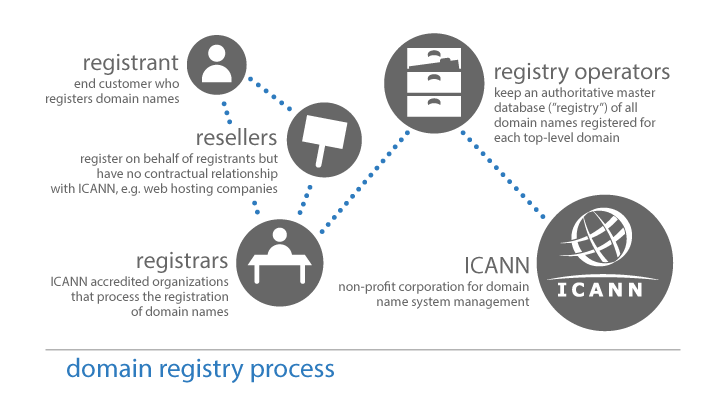Domain Name Registration
12/06/2020Domain name registration is the act of reserving a name on the Internet for a certain period, usually one year. It is important to know that this domain will remain yours for as long as you renew it and there is no way to purchase a domain name forever.
Domain name registration is necessary for a website, an email or another web service. However you don’t have to always register a new domain name. Many companies allow you to use subdomains of their domain names for a website, or you can have an email with their primary domain (ex. yahoo.com, gmail.com).
The most important thing about a domain name registration is that it gives you personality and recognized identity. Once you register a domain name, the information about its owner is publicly available.
The price for a domain name registration varies greatly on its extension. For example, the most common .com is the most affordable one, while some country-specific domain name extensions are 5 times more expensive.
Domain Name Registration Process
In order to reserve a domain name in a gTLD, a domain name registrant must register it with an ICANN-accredited registrar. The registrar will check if the domain name is available for registration and create a WHOIS record with the domain name registrant’s information. It is also possible to register domain names through a registrar’s resellers.

The diagram below illustrates the main functions of the parties that are usually involved in the process.
A domain name registrant is the person or organization who has registered the domain name. In order to do so, the domain name registrant will usually apply online to a domain registrar or one of their resellers. The domain name registrant is bound by the terms and conditions of the registrar with which it registers its domain name, for instance adhering to a certain code of conduct or indemnifying the registrar and registry against any legal or civil action taken as a result of use of the domain name. Domain name registrants have certain responsibilities that are incorporated into these terms and conditions like payment of registration fees and submission and timely update of accurate data.
In addition to registering the domain name, domain name registrants also need to have their domain names listed on name servers in order for that domain name to be reachable on the Internet. A domain name registrant is responsible for procuring or hosting his or her own name server if the registrar does not offer this service or he or she has opted out of the registrar’s service.
In some cases, a person or organization who does not wish to have their information listed in WHOIS may contract with a proxy service provider to register domain names on their behalf. In this case, the service provider is the domain name registrant, not the end customer.
Registrars are organizations accredited by ICANN and certified by the registries to sell domain names. They are bound by the Registrar Accreditation Agreement (RAA) with ICANN, and by their agreements with the registries. The RAA sets out responsibilities for the registrar including maintenance of WHOIS data, submission of data to registries, facilitating public WHOIS queries, ensuring domain name registrants details are escrowed, and complying with RAA conditions relating to the conclusion of the domain name registration period.
Some domain name registrants may opt to register through a reseller. These organizations are affiliated or under contract with registrars, and usually offer other services such as web hosting, email mailboxes etc. Resellers are bound by their agreements with the registrar(s) whose services they sell; they are not accredited by ICANN. However, the registrar for whom they are re-selling will still be the sponsor for the domain name registration and accountable for the domain names sold by the reseller.
While registrars are contracted to conduct the day-to-day business of selling domain name registrations, registries are responsible for maintaining the registry for each TLD. The responsibilities of the registries include accepting registration requests (whether from registrars or directly from domain name registrants), maintaining a database of the necessary domain name registration data and providing name servers to publish the zone file data (i.e. information about the location of a domain name) throughout the Internet.
The Internet Corporation for Assigned Names and Numbers (ICANN) is the non-profit organization that oversees the assignment of both IP addresses and domain names. It has responsibility for managing root server and TLD name system management and has contractual agreements with both registries and registrars that provide the foundation for the WHOIS system.
[…] VIEW […]